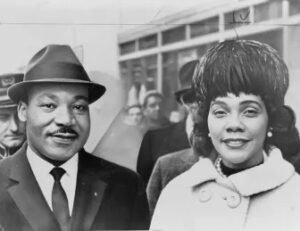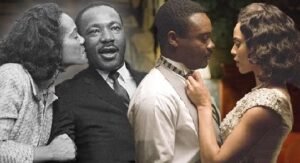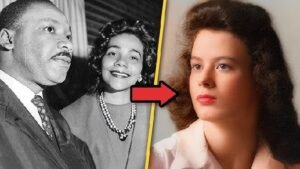Introduction
Martin Luther King Jr. was a beacon of hope for millions of Americans and a key figure in the Civil Rights Movement. His remarkable contributions to society, including leading peaceful protests and advocating for racial equality, earned him a Nobel Peace Prize and the admiration of people worldwide. However, behind the public figure, there were complexities in his personal life that remain a topic of discussion today Did Martin Luther King Cheat on His Wife.
One question that has surfaced over the years is whether Martin Luther King Jr. cheated on his wife, Coretta Scott King. In this article, we will delve deep into Martin Luther King’s personal life, exploring both his marriage and the controversies that surrounded his relationships outside of it. While his legacy is one of social justice and activism, the truth behind his marriage and personal behavior has sparked curiosity and debate.
Who Was Martin Luther King Jr.?
Before addressing the allegations and controversies, it’s important to briefly discuss who Martin Luther King Jr. was, his significant contributions, and his impact on American society.
Biography
| Full Name | Martin Luther King Jr. |
|---|---|
| Date of Birth | January 15, 1929 |
| Place of Birth | Atlanta, Georgia, USA |
| Date of Death | April 4, 1968 |
| Age at Death | 39 years old |
| Nationality | American |
| Profession | Civil Rights Leader, Minister, Activist |
| Spouse | Coretta Scott King |
| Children | Yolanda, Martin III, Dexter, Bernice |
| Net Worth (At Time of Death) | $250,000 (approx.) |

Martin Luther King Jr. was an American Baptist minister and social activist who led the Civil Rights Movement from the mid-1950s until his assassination in 1968. He advocated for nonviolent civil disobedience and played a pivotal role in the desegregation of American society.
He is perhaps best known for his leadership during the Montgomery Bus Boycott in 1955 and his iconic “I Have a Dream” speech delivered during the 1963 March on Washington. King’s nonviolent tactics influenced the civil rights movements across the globe and helped dismantle institutional racism in the United States.
Martin Luther King’s Marriage to Coretta Scott King
One of the most influential relationships in Martin Luther King’s life was his marriage to Coretta Scott King. Their partnership spanned over a decade and played a crucial role in his success as an activist.
A Love Story in the Midst of Activism
Martin Luther King Jr. and Coretta Scott met in 1952 when King was still a young, rising leader in the Civil Rights Movement. The couple married on June 18, 1953, and had four children together. Throughout their marriage, Coretta was not only a devoted wife but also an active participant in the civil rights movement, organizing and advocating for social change alongside her husband.
Coretta played an instrumental role in maintaining King’s legacy after his assassination in 1968. She became a strong advocate for peace and social justice, leading the efforts to establish Martin Luther King Jr. Day as a national holiday. Despite facing immense personal and public challenges, Coretta Scott King demonstrated unwavering strength, continuing her work for racial equality long after her husband’s death.
Did Martin Luther King Cheat on His Wife? The Allegations
The question of whether Martin Luther King Jr. cheated on his wife has been a subject of controversy for decades. While many admire his leadership, the allegations of infidelity have overshadowed some of his personal life. In the years following his death, several reports surfaced suggesting that King had extramarital affairs during his marriage to Coretta.
The FBI and Infidelity Allegations
The allegations of infidelity first came to light through the efforts of the Federal Bureau of Investigation (FBI). The FBI, under the leadership of J. Edgar Hoover, had been monitoring King throughout his rise to prominence. The Bureau’s efforts to discredit King included surveillance on his personal life, and in the early 1960s, FBI reports began to surface about King’s alleged infidelity.
These reports, often gathered through wiretaps and surveillance, suggested that King had engaged in multiple extramarital relationships during his marriage to Coretta. While the veracity of these claims has been disputed, and many argue that the FBI had an ulterior motive in attempting to tarnish King’s character, these allegations have been part of the public discourse surrounding his life.
The Controversial “FBI Tapes”
The controversy intensified when “FBI tapes” allegedly documenting King’s affairs were leaked to the public. These tapes were part of the FBI’s surveillance efforts during the 1960s. On these recordings, King can be heard engaging in inappropriate conversations with women, further fueling suspicions about his infidelity.
However, the tapes were released under questionable circumstances, and their authenticity has been debated for years. Some scholars and historians argue that these recordings were used as part of a smear campaign against King to undermine his leadership. Nonetheless, the tapes have become a point of contention in discussions about King’s personal life.
Coretta’s Response
Despite the public allegations and rumors about Martin Luther King’s infidelity, Coretta Scott King largely remained supportive of her husband’s legacy. She never publicly confronted him regarding these allegations, and after his death, she worked tirelessly to ensure his message of equality, justice, and peace continued to resonate worldwide.
In interviews later in her life, Coretta did express how challenging it had been to balance King’s public persona with the rumors surrounding his personal life. While she may have known about the allegations, Coretta always remained steadfast in her belief that her husband’s actions in the public sphere far outweighed any private shortcomings.
The Legacy of Martin Luther King Jr.
Despite the controversy surrounding Martin Luther King’s personal life, his contributions to society cannot be overshadowed. His leadership in the Civil Rights Movement continues to inspire generations, and his commitment to nonviolence and social justice remains relevant today.
His Impact on Civil Rights
Martin Luther King Jr.’s work fundamentally changed the landscape of American society. He was instrumental in the passage of the Civil Rights Act of 1964 and the Voting Rights Act of 1965, both of which helped dismantle institutional racism in the United States. Through his leadership, King brought attention to the injustices faced by African Americans and called for change through peaceful protest.
His unwavering dedication to his cause earned him the Nobel Peace Prize in 1964, and his speeches, such as the famous “I Have a Dream” speech, continue to be revered around the world.
The King Family Legacy
Today, Martin Luther King Jr.’s family, led by his children and Coretta Scott King’s legacy, continues to advocate for the issues that were close to his heart. The King Center, established in Atlanta, Georgia, is a living tribute to his life and work.
Table: Martin Luther King Jr.’s Personal Information

| Category | Details |
|---|---|
| Full Name | Martin Luther King Jr. |
| Date of Birth | January 15, 1929 |
| Date of Death | April 4, 1968 |
| Age at Death | 39 Years |
| Spouse | Coretta Scott King |
| Children | Yolanda, Martin III, Dexter, Bernice |
| Nationality | American |
| Net Worth (at Death) | $250,000 (estimated) |
Martin Luther King’s Leadership and the Civil Rights Movement
In the 1950s, Martin Luther King Jr. emerged as one of the leading figures in the Civil Rights Movement. His leadership was deeply rooted in the principles of nonviolence, which he adopted from the teachings of Mahatma Gandhi. King was determined to secure civil rights for African Americans, particularly in the areas of education, employment, and voting rights, while maintaining a commitment to peaceful protests.
Montgomery Bus Boycott
King’s rise to prominence began after Rosa Parks, an African American woman, was arrested for refusing to give up her seat on a segregated bus in Montgomery, Alabama, in December 1955. In response to her arrest, local African American leaders, including King, organized a boycott of the city’s bus system. The Montgomery Bus Boycott lasted for over a year and was pivotal in raising awareness about segregation and racial inequality in the United States. The boycott ended with the Supreme Court ruling that segregation on public buses was unconstitutional.
King’s role in the boycott solidified his reputation as a powerful orator and leader. His ability to unite diverse communities and inspire a call for change through peaceful resistance set the tone for the future of the Civil Rights Movement.
March on Washington
King’s leadership reached its peak during the 1963 March on Washington for Jobs and Freedom. This historic event brought together over 250,000 people from all walks of life in support of racial equality. It was during this march that King delivered his iconic “I Have a Dream” speech, which became one of the most famous speeches in American history. In it, he called for an end to racism, segregation, and discrimination and emphasized his vision for a future where people would “not be judged by the color of their skin but by the content of their character.”
The March on Washington was a turning point in the Civil Rights Movement and is widely credited with influencing the passage of landmark legislation, including the Civil Rights Act of 1964 and the Voting Rights Act of 1965.
Martin Luther King’s Personal Struggles and Mental Health
Despite his public persona as a leader, Martin Luther King Jr. faced significant personal struggles. His role in the Civil Rights Movement required immense emotional and physical labor, and the constant stress took a toll on his mental health.
Stress and Depression
King himself admitted to experiencing bouts of depression, particularly during times of intense pressure or personal crises. The weight of his leadership and the constant threats to his life wore heavily on him. In some personal letters and interviews, King revealed his emotional struggles, admitting that he sometimes felt overwhelmed by the burden of his responsibility.
While he was often seen as a pillar of strength in the public eye, King’s vulnerability to mental health issues highlighted the personal toll that activism can take on a leader. His wife, Coretta Scott King, played an essential role in supporting him during these difficult moments, providing him with both emotional strength and practical support as they navigated the personal and professional challenges of their roles.
His Relationship with Stress and Family
Throughout his marriage, King struggled to balance the demands of his activism with his familial responsibilities. On one hand, he was leading marches, delivering speeches, and meeting with political leaders, while on the other hand, he had to tend to the needs of his wife and four children. Coretta, a strong woman in her own right, had her own career in the civil rights movement, and their children grew up with the added pressures of being the children of a prominent public figure.
While the King family shared a commitment to social justice, the personal toll of King’s work undoubtedly affected their family dynamic. His infidelities, the constant threat of violence, and the public scrutiny all created stress for his family, especially Coretta. Some of these factors led to moments of tension between Martin and Coretta, though they generally stayed united in their public commitment to the cause.
The Role of Coretta Scott King in the Movement
Coretta Scott King was not just a passive partner in Martin Luther King Jr.’s work; she was an active participant in the Civil Rights Movement, carrying out many roles herself.
A Leader in Her Own Right
After Martin Luther King’s assassination in 1968, Coretta Scott King took up the mantle of leadership, advocating for civil rights and justice in her own right. She worked tirelessly to ensure that Martin’s legacy lived on, participating in global peace efforts, organizing marches, and continuing her husband’s work with the Southern Christian Leadership Conference (SCLC).
In addition to her advocacy, Coretta was crucial in the establishment of the Martin Luther King Jr. Center for Nonviolent Social Change in Atlanta. This center remains a global symbol of the commitment to nonviolence and civil rights that King advocated for throughout his life.
Pushing for the National Holiday
One of Coretta’s most significant achievements was her work in making Martin Luther King Jr. Day a national holiday. Despite facing significant opposition from some segments of the population, she pushed for the creation of this holiday to honor her husband’s legacy and ensure that future generations would continue to remember his contributions.
It was only through her persistent advocacy and the support of many others that Congress passed the bill in 1983, officially designating Martin Luther King Jr. Day as a national holiday. The holiday became a symbol of the country’s acknowledgment of racial inequality and a day dedicated to the ongoing fight for civil rights.
The Impact of the Infidelity Allegations on Martin Luther King’s Legacy
The revelations about Martin Luther King’s alleged infidelities have sparked intense debate about how to view his legacy. Some people argue that these personal transgressions should not overshadow the monumental contributions King made to society, while others believe that they must be acknowledged as part of the larger narrative of his life.

How Historians View the Allegations
Historians generally agree that while King’s personal life was complicated, his professional achievements were extraordinary. Martin Luther King’s leadership in the fight against racial segregation, his advocacy for nonviolent resistance, and his ability to bring together diverse groups of people in the name of justice have shaped the course of American history.
However, the infidelity allegations are often discussed in the context of his character. Many scholars note that the FBI’s attempts to discredit King through personal smear campaigns were politically motivated, especially as he became more vocal in his opposition to the Vietnam War and his advocacy for economic justice. The FBI, led by J. Edgar Hoover, viewed King’s rise as a threat to the status quo and used personal allegations to try to discredit him. These actions have led many to question the accuracy and motives behind the claims of infidelity.
Public Perception and the Impact on His Legacy
The question of whether Martin Luther King Jr. was unfaithful to his wife, Coretta Scott King, does complicate his public persona for some people. The idea of a leader who preached nonviolence and moral integrity being involved in extramarital affairs creates a paradox. This complexity highlights the difficulty of separating the personal from the public when discussing historical figures.
Despite this, the overwhelming majority of people continue to view Martin Luther King Jr. as a hero and an icon of social justice. His ability to remain focused on the larger goal of racial equality, despite the challenges in his personal life, reflects his commitment to the cause. His personal failings, as controversial as they may be, do not diminish his achievements in the fight for justice, civil rights, and human dignity.
The Continuing Relevance of Martin Luther King’s Ideals Today
The personal complexities of Martin Luther King Jr.’s life serve as a reminder that historical figures are not immune to the flaws and struggles that come with being human. Nonetheless, the ideals that King espoused—justice, equality, and nonviolence—continue to resonate with people all around the world.
Today, his legacy continues to inspire activists fighting for racial equality, gender justice, and peace. The Black Lives Matter movement, for example, shares King’s commitment to peaceful protest and his insistence on confronting racial discrimination. Similarly, movements advocating for LGBTQ+ rights and economic justice can trace their roots to the work that Martin Luther King Jr. did during his lifetime.
While the question of Martin Luther King’s infidelity remains a contentious issue for some, it is his lasting contributions to the fight for civil rights that define his place in history.
Conclusion: The Complexities of Martin Luther King Jr.’s Life
Martin Luther King Jr.’s life, while primarily focused on advancing the cause of civil rights, was also marked by personal complexities. His alleged infidelities and the FBI’s attempts to tarnish his character complicate the narrative of his legacy. However, his immense contributions to racial equality, his enduring influence, and the commitment of his family to preserve his message ensure that King’s legacy continues to be celebrated.
Ultimately, Martin Luther King Jr.’s work as a leader, activist, and advocate for nonviolent change far outweighs the personal controversies that have surrounded his life. As we continue to reflect on his legacy, it is important to remember that his actions and words remain a guiding light for justice and equality.
Read More Also: Okieriete Onaodowan Wife: Everything You Need to Know